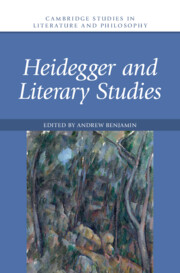Book contents
- Heidegger and Literary Studies
- Cambridge Studies in Literature and Philosophy
- Heidegger and Literary Studies
- Copyright page
- Contents
- Contributors
- Heidegger and Literature: An Introduction to the Question
- I Literature and Poetry
- 1 Heidegger’s Literary Secret
- 2 The Event’s Foreign Vernacular
- 3 Shared Habits: Love, Time, and The Magic Mountain in 1925
- 4 From Tool to Poem
- 5 Heidegger’s Use of Poetry
- II Heidegger and Greek Literature
- III Heidegger and Literary Works
- Heidegger, Index of Works
- General Index
- References
2 - The Event’s Foreign Vernacular
Denken and Dichten in Heidegger
from I - Literature and Poetry
Published online by Cambridge University Press: 09 November 2023
- Heidegger and Literary Studies
- Cambridge Studies in Literature and Philosophy
- Heidegger and Literary Studies
- Copyright page
- Contents
- Contributors
- Heidegger and Literature: An Introduction to the Question
- I Literature and Poetry
- 1 Heidegger’s Literary Secret
- 2 The Event’s Foreign Vernacular
- 3 Shared Habits: Love, Time, and The Magic Mountain in 1925
- 4 From Tool to Poem
- 5 Heidegger’s Use of Poetry
- II Heidegger and Greek Literature
- III Heidegger and Literary Works
- Heidegger, Index of Works
- General Index
- References
Summary
The significance of Heidegger’s engagement with poetry reaches beyond his remarks on poetic texts and the role of poetic composition, whether we consider his lecture courses on Hölderlin, his reflections on Greek tragedy, or his later essays on language and poetry. His view of Dichtung cannot be categorized under the rubrics of philosophical aesthetics, hermeneutics, phenomenological theory of art, or literary interpretation, as his unique investment in poetry and his idiomatic approach to Dichtung have in view a transformation of thought: a preparation of a non-metaphysical style of thinking, characterized by a new, non-conceptual rigor, which can be called “poietic.” Sketching this “other” thinking against the backdrop of the then most current techno-scientific developments, whether in cybernetics, physics or genetics, Heidegger insists on its preliminary scope and preparatory character. That is why the importance of Dichten in Heidegger’s work, especially its role in taking philosophy toward an otherwise to thinking can only be properly appreciated when we give its due to the “poetic” valence of his texts, which includes innovative textual composition, the syntactical and lexical texture of writing, its typographical experiments and verbal inventions, etymological explorations, and the inventive use of hyphens or quasi-tautological syntactic phrasing.
- Type
- Chapter
- Information
- Heidegger and Literary Studies , pp. 29 - 50Publisher: Cambridge University PressPrint publication year: 2023



